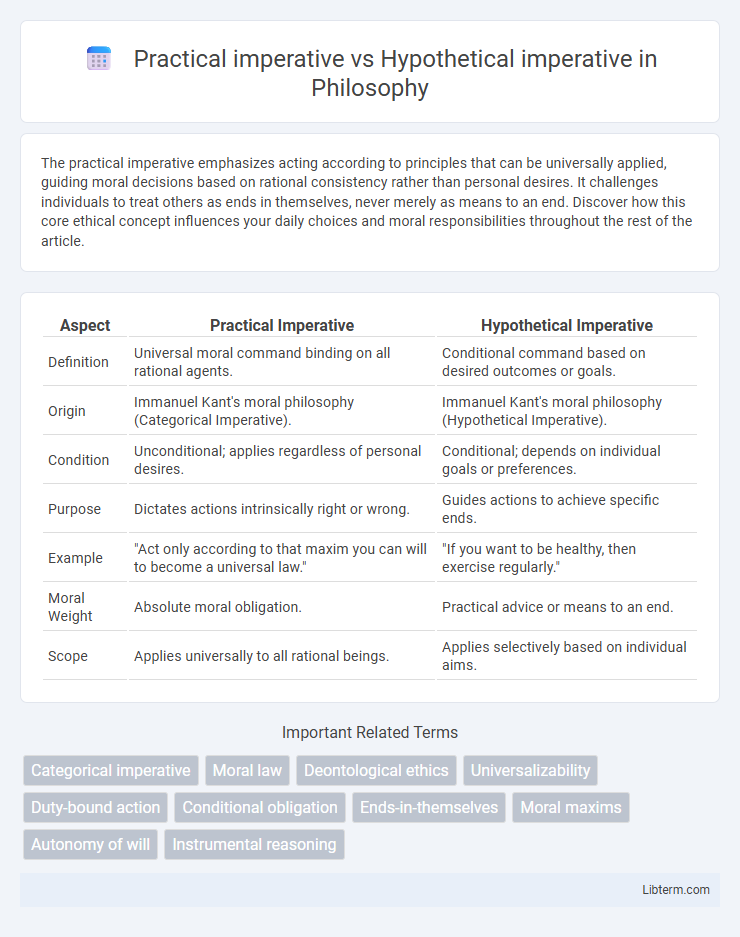The practical imperative emphasizes acting according to principles that can be universally applied, guiding moral decisions based on rational consistency rather than personal desires. It challenges individuals to treat others as ends in themselves, never merely as means to an end. Discover how this core ethical concept influences your daily choices and moral responsibilities throughout the rest of the article.
Table of Comparison
| Aspect | Practical Imperative | Hypothetical Imperative |
|---|---|---|
| Definition | Universal moral command binding on all rational agents. | Conditional command based on desired outcomes or goals. |
| Origin | Immanuel Kant's moral philosophy (Categorical Imperative). | Immanuel Kant's moral philosophy (Hypothetical Imperative). |
| Condition | Unconditional; applies regardless of personal desires. | Conditional; depends on individual goals or preferences. |
| Purpose | Dictates actions intrinsically right or wrong. | Guides actions to achieve specific ends. |
| Example | "Act only according to that maxim you can will to become a universal law." | "If you want to be healthy, then exercise regularly." |
| Moral Weight | Absolute moral obligation. | Practical advice or means to an end. |
| Scope | Applies universally to all rational beings. | Applies selectively based on individual aims. |
Introduction to Kantian Imperatives
Kantian imperatives distinguish between practical imperatives, which command actions necessary for moral duty independent of desires, and hypothetical imperatives, which guide actions conditionally based on achieving specific goals. Practical imperatives are categorical, meaning they apply universally and unconditionally, while hypothetical imperatives depend on individual inclinations or objectives. Understanding this differentiation is essential for grasping Immanuel Kant's moral philosophy and its emphasis on duty and rationality.
Defining Practical Imperative
The practical imperative, rooted in Kantian ethics, commands actions as universally necessary without conditions, emphasizing moral duty for its own sake. It contrasts with the hypothetical imperative, which prescribes actions contingent on achieving specific goals or desires. Understanding the practical imperative is essential for grasping the foundation of deontological ethics and the concept of unconditional moral obligations.
Understanding Hypothetical Imperative
Hypothetical imperatives are conditional commands that depend on an individual's desire to achieve a specific goal, such as "If you want to be healthy, you should exercise regularly." These imperatives contrast with practical imperatives, which are unconditional moral laws derived from reason, like Kant's categorical imperative. Understanding hypothetical imperatives involves recognizing their dependence on personal objectives and their role in guiding means to achieve ends rather than prescribing universal moral duties.
Key Differences Between Practical and Hypothetical Imperatives
Practical imperatives command actions based on moral duty and are unconditional, exemplified by Kant's categorical imperative, which requires acting only according to maxims that can be universal laws. Hypothetical imperatives are conditional and aimed at achieving specific outcomes, instructing what to do if one wants to attain a particular goal, such as "If you want to be healthy, exercise regularly." The key difference lies in practical imperatives' universality and moral necessity, contrasted with hypothetical imperatives' dependence on personal desires or objectives.
Real-life Examples of Practical Imperatives
Practical imperatives, as defined by Immanuel Kant, are commands that apply universally based on moral duty, such as "Always tell the truth," whereas hypothetical imperatives depend on personal goals, like "If you want to pass the exam, study hard." Real-life examples of practical imperatives include acting honestly in business transactions to uphold ethical standards and refusing to lie even when it might be beneficial. These moral imperatives guide consistent, principled behavior irrespective of individual desires or outcomes.
Real-life Examples of Hypothetical Imperatives
Hypothetical imperatives guide actions based on desired outcomes, such as "If you want to pass the exam, you should study regularly," illustrating goal-oriented behavior. For instance, a student deciding to attend extra classes to improve grades exemplifies following a hypothetical imperative. Similarly, a driver choosing to obey speed limits to avoid fines demonstrates decision-making contingent on specific objectives.
Moral Philosophy and the Practical Imperative
Kant's Practical Imperative, central to moral philosophy, commands actions that respect the inherent dignity of rational agents, contrasting with Hypothetical Imperatives which guide actions based on specific goals or desires. The Practical Imperative demands that individuals act according to maxims that could be universal laws, emphasizing duty and moral obligation regardless of personal inclinations. This principle underpins Kant's deontological ethics, highlighting the necessity of treating humanity always as an end in itself, not merely as a means.
Applications of Hypothetical Imperatives in Daily Life
Hypothetical imperatives guide actions based on desired outcomes, often manifesting in daily decisions such as "If you want to stay healthy, exercise regularly" or "If you need to save money, cut unnecessary expenses." These imperatives are conditional and instrumental, depending on personal goals or external circumstances to dictate behavior. Common applications include goal-oriented planning, such as studying to pass exams or eating well to improve fitness, illustrating their practicality in everyday life.
Critiques and Limitations of Both Imperatives
The Practical Imperative, grounded in Kantian ethics, faces critique for its rigidity and potential neglect of contextual nuances, limiting its applicability across diverse moral dilemmas. The Hypothetical Imperative, contingent on individual desires and goals, is criticized for lacking universal moral authority and leading to relativism. Both imperatives exhibit limitations in addressing complex ethical scenarios where conflicting duties or diverse motivations challenge simplified categorical or conditional prescriptions.
Relevance of Kant’s Imperatives in Modern Ethics
Kant's practical imperatives emphasize actions performed out of duty and moral obligation, contrasting with hypothetical imperatives, which are conditional and goal-oriented. In modern ethics, this distinction highlights the importance of universal moral principles over situational or outcome-based decision-making, reinforcing the concept of intrinsic moral duties. The relevance of Kant's imperatives persists in contemporary debates on ethical consistency, human rights, and the formulation of laws grounded in objective moral reasoning.
Practical imperative Infographic

 libterm.com
libterm.com